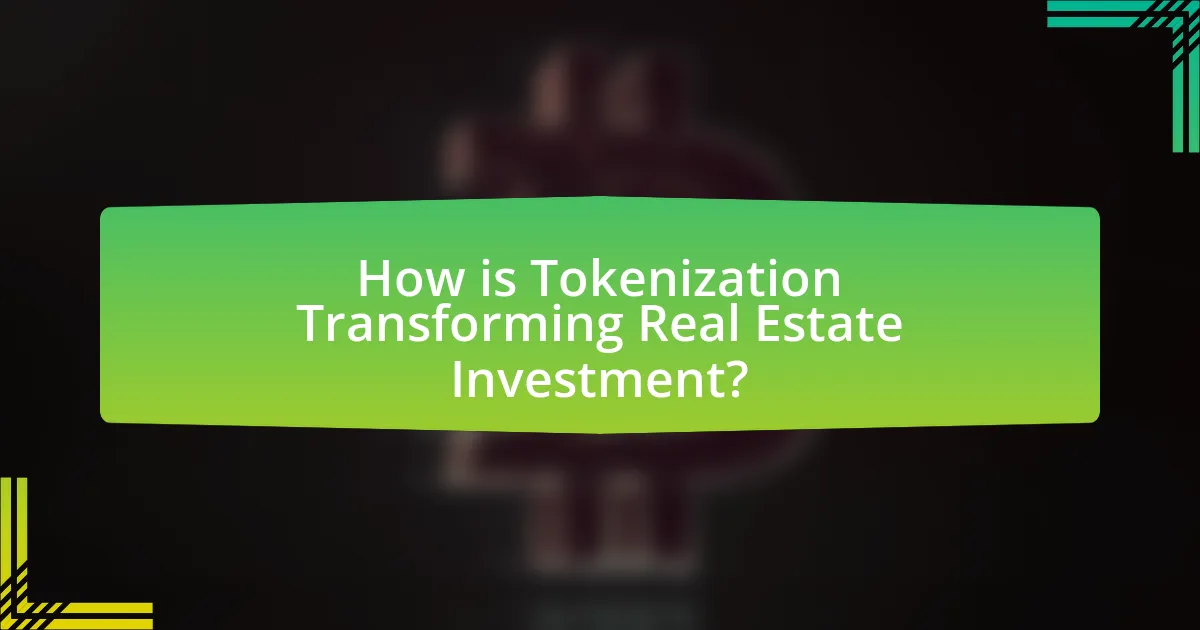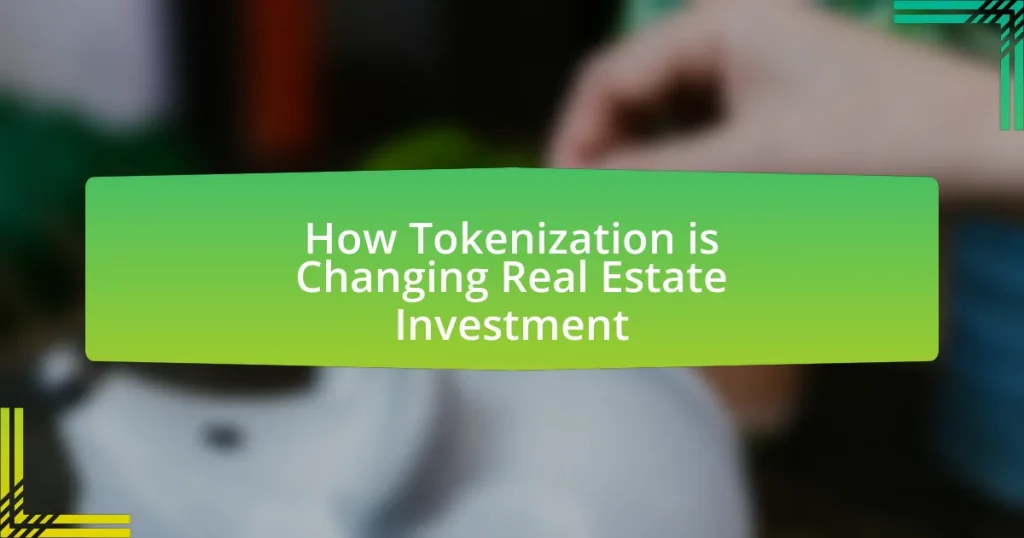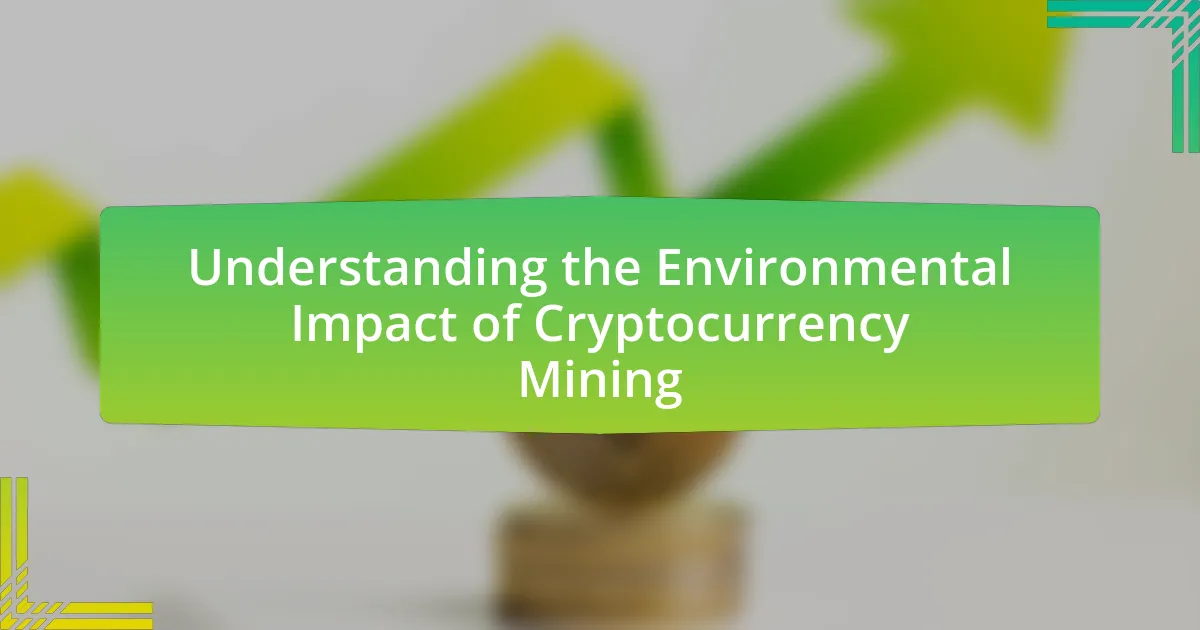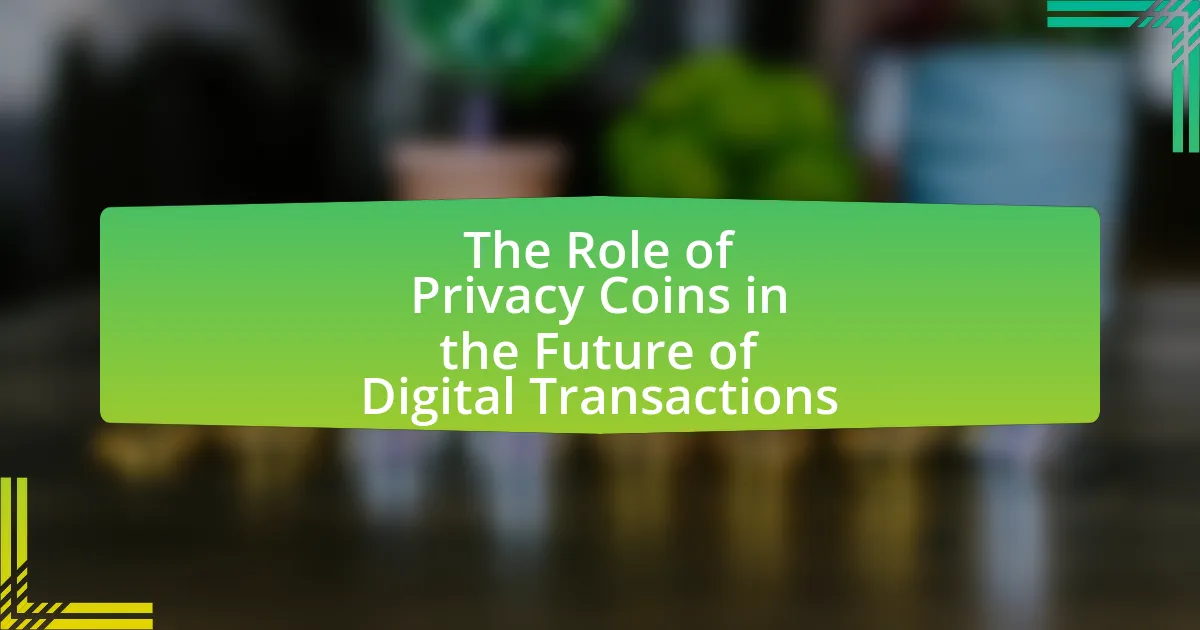Tokenization is revolutionizing real estate investment by facilitating fractional ownership through blockchain technology, which lowers investment barriers and enhances market liquidity. This process allows properties to be divided into digital tokens, enabling multiple investors to own shares without the need for substantial capital. Key advantages include increased accessibility, improved transaction efficiency, and enhanced transparency and security in ownership records. However, challenges such as regulatory uncertainty and security concerns must be addressed for widespread adoption. The article explores the implications of tokenization on property ownership, future trends, and best practices for investors in this evolving landscape.

How is Tokenization Transforming Real Estate Investment?
Tokenization is transforming real estate investment by enabling fractional ownership, which lowers the barrier to entry for investors. This process allows properties to be divided into digital tokens on a blockchain, making it possible for multiple investors to own a share of a property. According to a report by Deloitte, tokenization can increase liquidity in the real estate market, as these tokens can be traded on secondary markets, providing investors with more flexibility and access to capital. Additionally, tokenization enhances transparency and security in transactions, as blockchain technology ensures that all ownership records are immutable and easily verifiable.
What is tokenization in the context of real estate?
Tokenization in the context of real estate refers to the process of converting ownership rights in a property into digital tokens on a blockchain. This method allows for fractional ownership, enabling multiple investors to own a share of a property without needing to purchase it outright. According to a report by Deloitte, tokenization can enhance liquidity in real estate markets by allowing assets to be traded more easily and efficiently, thereby broadening access to investment opportunities for a wider range of investors.
How does tokenization differ from traditional real estate investment?
Tokenization differs from traditional real estate investment by enabling fractional ownership through blockchain technology, which allows investors to purchase shares of a property rather than the entire asset. This method increases liquidity and accessibility, as it lowers the minimum investment threshold and allows for easier transfer of ownership. Traditional real estate investment typically requires significant capital and involves lengthy processes for buying, selling, or financing properties, whereas tokenization streamlines these processes and enhances market efficiency.
What technologies enable tokenization in real estate?
Blockchain technology enables tokenization in real estate by providing a decentralized and secure ledger for recording transactions. This technology allows for the creation of digital tokens that represent ownership shares in real estate assets, facilitating fractional ownership and increasing liquidity. Smart contracts, which are self-executing contracts with the terms of the agreement directly written into code, further enhance this process by automating transactions and ensuring compliance with regulations. Additionally, platforms utilizing distributed ledger technology streamline the process of buying, selling, and managing real estate investments, making it more accessible to a broader range of investors.
Why is tokenization gaining popularity in real estate?
Tokenization is gaining popularity in real estate primarily due to its ability to enhance liquidity and accessibility for investors. By converting real estate assets into digital tokens on a blockchain, investors can buy and sell fractional ownership, which lowers the barrier to entry for smaller investors. This shift is supported by the growing demand for alternative investment opportunities and the increasing adoption of blockchain technology, which provides transparency and security in transactions. According to a report by Deloitte, the tokenization of real estate could unlock $1.4 trillion in value by 2025, highlighting its potential to transform the investment landscape.
What advantages does tokenization offer to investors?
Tokenization offers investors increased liquidity, fractional ownership, and access to a broader range of investment opportunities. By converting real estate assets into digital tokens, investors can buy and sell smaller portions of properties, which enhances market fluidity. For instance, a property valued at $1 million can be tokenized into 1,000 tokens worth $1,000 each, allowing multiple investors to participate without needing substantial capital. Additionally, tokenization can lower transaction costs and streamline processes through smart contracts, making investments more efficient and accessible.
How does tokenization enhance liquidity in real estate markets?
Tokenization enhances liquidity in real estate markets by converting physical assets into digital tokens that can be easily traded on blockchain platforms. This process allows fractional ownership, enabling a broader range of investors to buy and sell shares of real estate properties, thus increasing market participation. According to a report by the World Economic Forum, tokenization can reduce transaction costs and time, making it easier for investors to enter and exit positions. Additionally, the ability to trade tokens 24/7 on various exchanges further contributes to liquidity, as it allows for quicker transactions compared to traditional real estate sales, which can take weeks or months to complete.
What challenges does tokenization face in real estate investment?
Tokenization in real estate investment faces several challenges, including regulatory uncertainty, technological barriers, and market acceptance. Regulatory uncertainty arises because existing laws may not adequately address the unique aspects of tokenized assets, leading to potential legal complications. Technological barriers include the need for robust blockchain infrastructure and cybersecurity measures to protect digital assets from fraud and hacking. Market acceptance is hindered by a lack of understanding and trust among traditional investors, who may be hesitant to adopt new investment models. These challenges can impede the widespread adoption of tokenization in the real estate sector.
What regulatory hurdles must be overcome for tokenization?
Tokenization must overcome several regulatory hurdles, primarily related to securities laws, anti-money laundering (AML) requirements, and consumer protection regulations. In many jurisdictions, tokenized assets may be classified as securities, necessitating compliance with registration and disclosure obligations under securities regulations. For instance, the U.S. Securities and Exchange Commission (SEC) has indicated that tokens representing ownership in real estate could fall under the definition of securities, requiring issuers to register or qualify for an exemption. Additionally, tokenization platforms must implement robust AML measures to prevent illicit activities, as mandated by financial regulatory authorities. Compliance with consumer protection laws is also essential to ensure that investors are adequately informed about the risks associated with tokenized investments. These regulatory frameworks are critical to fostering trust and legitimacy in the tokenization of real estate assets.
How do security concerns impact the adoption of tokenization?
Security concerns significantly hinder the adoption of tokenization in real estate investment. These concerns arise from potential vulnerabilities in data protection, fraud, and regulatory compliance, which can deter investors and institutions from embracing tokenized assets. For instance, a report by the World Economic Forum highlights that 77% of executives believe that cybersecurity risks are a major barrier to blockchain adoption, including tokenization. This apprehension leads to a cautious approach, where stakeholders prioritize robust security measures and regulatory frameworks before fully committing to tokenization initiatives.
How does tokenization affect the real estate investment landscape?
Tokenization significantly transforms the real estate investment landscape by enabling fractional ownership, which lowers the barrier to entry for investors. This process allows properties to be divided into digital tokens, representing shares of ownership, thus making it possible for individuals to invest in high-value assets with smaller amounts of capital. For instance, a property valued at $1 million can be tokenized into 1,000 tokens worth $1,000 each, allowing multiple investors to participate. Furthermore, tokenization enhances liquidity in real estate markets, as these tokens can be traded on blockchain platforms, facilitating quicker transactions compared to traditional real estate sales. According to a report by Deloitte, tokenization can increase market efficiency and transparency, as blockchain technology provides a secure and immutable record of ownership and transaction history.
What are the implications of tokenization for property ownership?
Tokenization significantly alters property ownership by enabling fractional ownership, which increases accessibility for investors. This process allows real estate assets to be divided into digital tokens on a blockchain, making it possible for multiple investors to own a share of a property. For instance, a property valued at $1 million can be tokenized into 1,000 tokens, each worth $1,000, allowing investors to buy in at a lower entry point. Furthermore, tokenization enhances liquidity in the real estate market, as tokens can be traded on secondary markets, providing investors with the ability to sell their shares more easily compared to traditional real estate transactions. This shift not only democratizes investment opportunities but also streamlines the buying and selling process, reducing transaction costs and time.
How does tokenization democratize access to real estate investments?
Tokenization democratizes access to real estate investments by enabling fractional ownership, allowing individuals to invest in properties with lower capital requirements. This process involves converting real estate assets into digital tokens on a blockchain, which can be bought and sold by a wider range of investors. For instance, traditional real estate investments often require substantial upfront capital, limiting participation to wealthy individuals or institutional investors. In contrast, tokenization allows for smaller investments, sometimes as low as a few hundred dollars, thereby broadening the investor base. According to a report by Deloitte, tokenization can increase liquidity in the real estate market, making it easier for investors to enter and exit positions. This increased accessibility fosters a more inclusive investment environment, empowering individuals from diverse financial backgrounds to participate in real estate markets.
What role do smart contracts play in tokenized real estate transactions?
Smart contracts automate and enforce the terms of tokenized real estate transactions, ensuring transparency and security. They facilitate the execution of agreements without intermediaries by automatically triggering actions such as fund transfers or property transfers when predefined conditions are met. For instance, a smart contract can release funds to a seller only when the buyer’s payment is confirmed, reducing the risk of fraud. Additionally, smart contracts maintain an immutable record of transactions on the blockchain, enhancing trust among parties involved. This technology streamlines processes, lowers transaction costs, and increases efficiency in real estate investments.
What future trends can we expect in tokenized real estate investment?
Future trends in tokenized real estate investment include increased regulatory clarity, broader market adoption, and enhanced liquidity. Regulatory bodies are beginning to establish frameworks that support tokenization, which will foster investor confidence and encourage institutional participation. Additionally, as blockchain technology matures, more real estate assets will be tokenized, allowing for fractional ownership and making investments accessible to a wider audience. Enhanced liquidity will result from secondary markets emerging for trading these tokens, enabling investors to buy and sell their stakes more easily. According to a report by Deloitte, the global real estate tokenization market is projected to grow significantly, driven by these trends and the increasing demand for innovative investment solutions.
How might tokenization evolve with advancements in blockchain technology?
Tokenization is likely to evolve significantly with advancements in blockchain technology by enhancing security, scalability, and interoperability. As blockchain technology matures, it will enable more sophisticated smart contracts that can automate complex transactions and compliance processes in real estate investment. For instance, improvements in blockchain protocols could facilitate faster transaction speeds and lower costs, making tokenized real estate more accessible to a broader range of investors. Additionally, the integration of decentralized finance (DeFi) with tokenization may allow for innovative financing options, such as fractional ownership and liquidity solutions, which can attract more participants to the real estate market. These advancements are supported by the growing adoption of blockchain in various sectors, indicating a trend towards increased efficiency and transparency in asset management.
What potential innovations could emerge from tokenization in real estate?
Tokenization in real estate could lead to innovations such as fractional ownership, enhanced liquidity, and improved transparency in transactions. Fractional ownership allows multiple investors to own a share of a property, making real estate investment accessible to a broader audience. Enhanced liquidity results from the ability to trade tokenized assets on secondary markets, enabling quicker sales compared to traditional real estate transactions. Improved transparency is achieved through blockchain technology, which provides a secure and immutable record of ownership and transaction history, reducing fraud and increasing trust among investors. These innovations can transform the real estate investment landscape by democratizing access and streamlining processes.
What best practices should investors consider when engaging with tokenized real estate?
Investors engaging with tokenized real estate should prioritize due diligence, regulatory compliance, and understanding the technology involved. Conducting thorough research on the property, the tokenization platform, and the legal framework ensures informed investment decisions. Regulatory compliance is crucial, as tokenized real estate must adhere to local laws and securities regulations, which can vary significantly by jurisdiction. Understanding the underlying blockchain technology and smart contracts is essential for assessing risks and benefits, as these elements impact transaction security and transparency. According to a report by Deloitte, the integration of blockchain in real estate can enhance transaction efficiency and reduce costs, highlighting the importance of technological comprehension in this evolving investment landscape.






